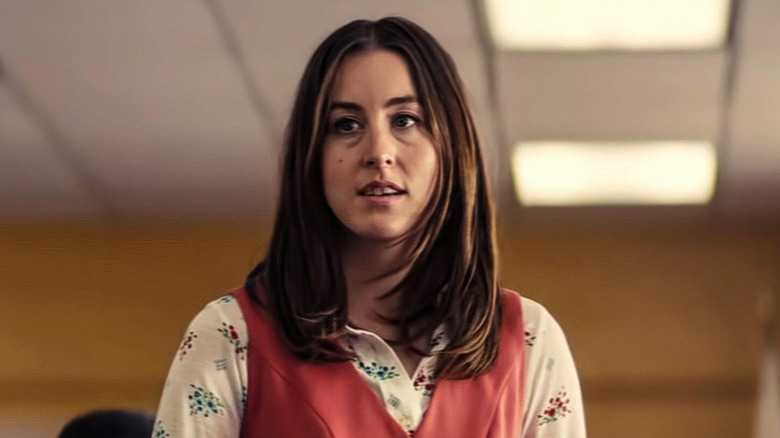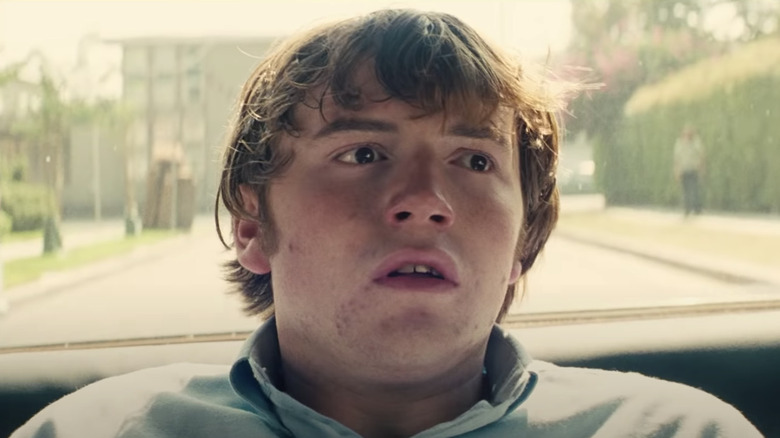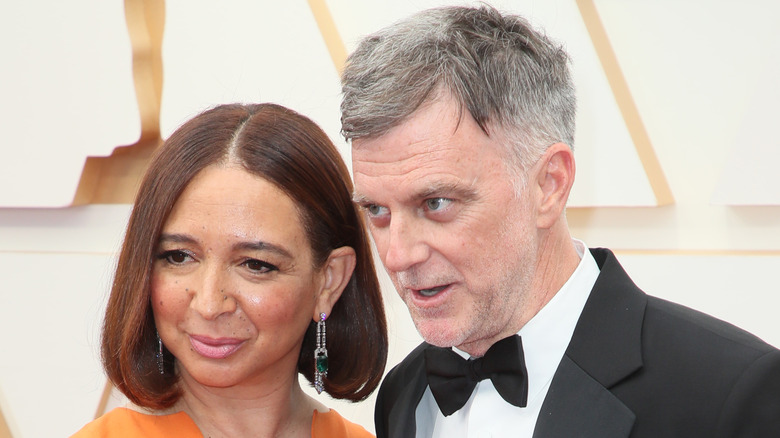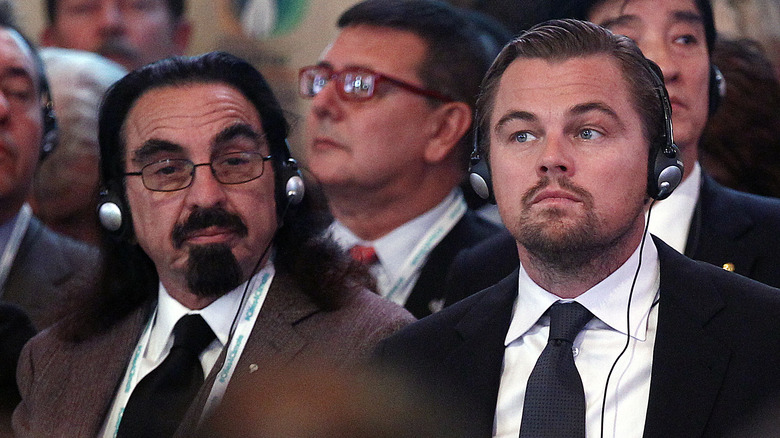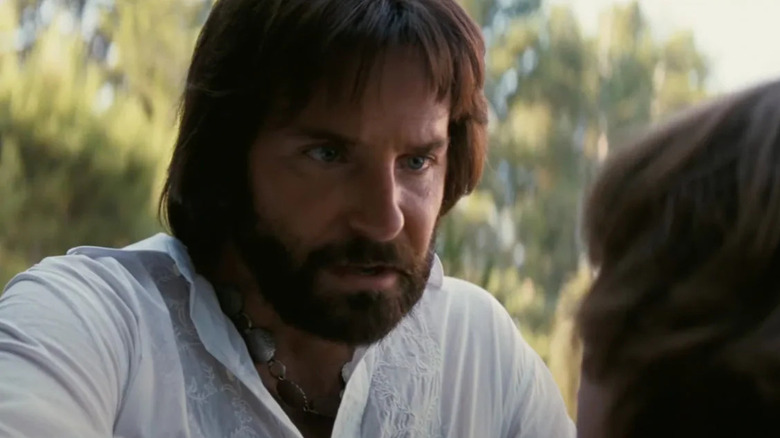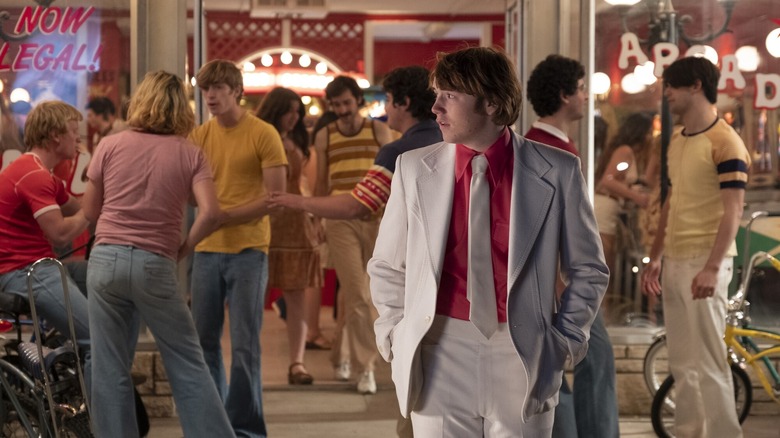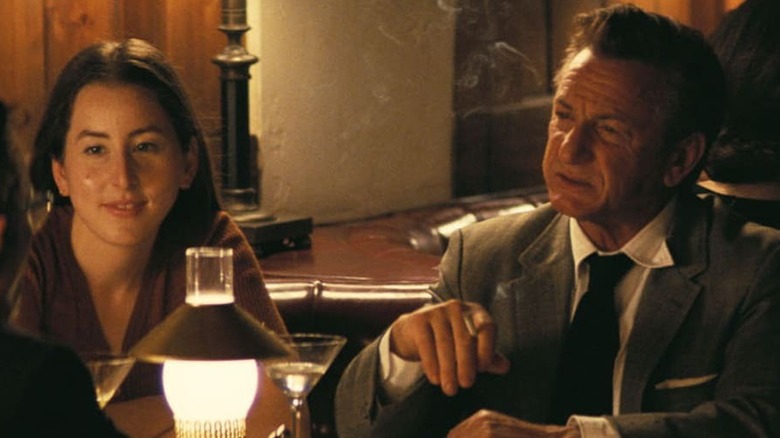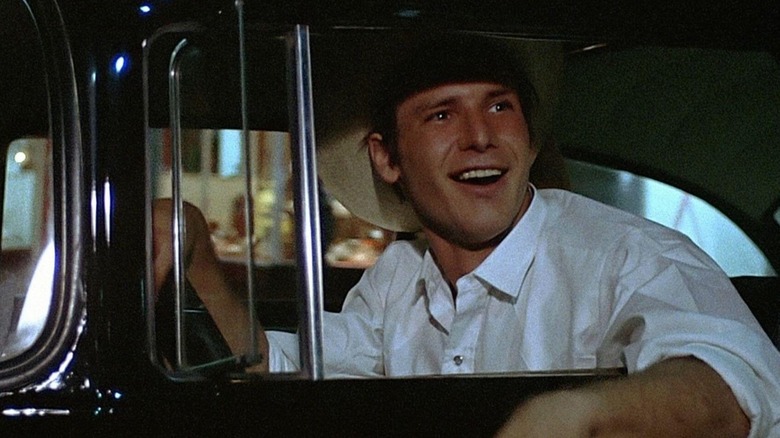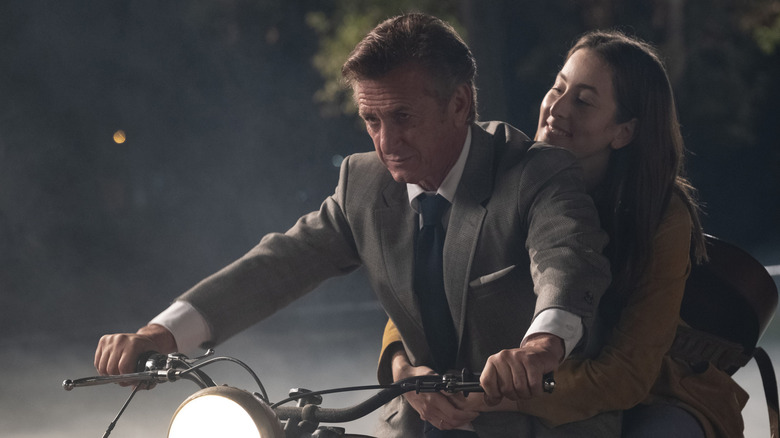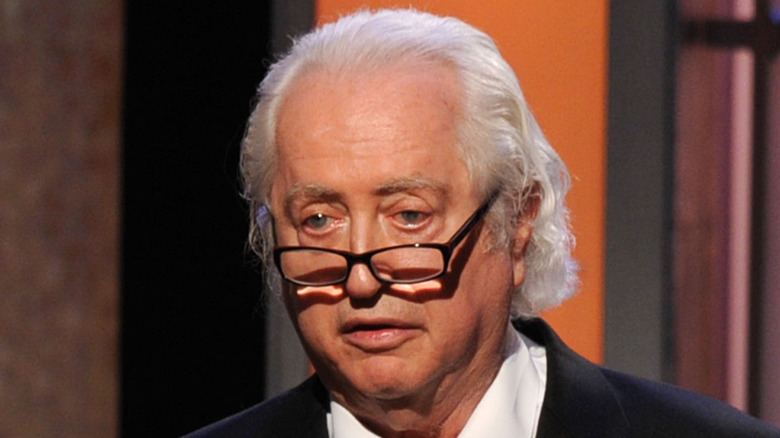The Untold Truth Of Licorice Pizza
2021 was a standout year for movies, with several noteworthy films coming from some of the world's most renowned and visionary directors working today, like Jane Campion's "The Power of the Dog," Guillermo del Toro's "Nightmare Alley," and Ryusuke Hamaguchi's "Drive My Car." It was an impressive lineup of films that audiences delighted in seeing, with Paul Thomas Anderson's nostalgic coming-of-age romance, "Licorice Pizza," just one more film in an already impressive year of movies.
Set in San Fernando Valley in 1973, "Licorice Pizza" tells the story of Gary Valentine (Cooper Hoffman), a 15-year-old child actor and aspiring businessman that begins courting the 25-year-old photographer's assistant Alana (Alana Haim). Their relationship is complex, mired by romantic rivals, professional jealousies, and individual fears about their career paths. However, it eloquently captures the vibrant sense of youthful freedom synonymous with '70s culture.
"Licorice Pizza" earned rave reviews upon release, leading to Academy Award, BAFTA, and Golden Globe nominations for Best Picture and nominations for Best Actor (Hoffman), Best Actress (Haim), Best Original Screenplay, and Best Director (via IMDb). As celebrated and well-received as "Licorice Pizza" was, there is still some behind-the-scenes trivia audiences can learn to enrich their viewing experience. Here are some of the most interesting facts about "Licorice Pizza."
The premise for the film came to Paul Thomas Anderson several decades ago
The events of "Licorice Pizza" are set in motion when the charismatic 15-year-old Gary Valentine meets photographer's assistant Alana on his school's picture day. As he waits to have his photo taken, he pesters Alana into having a dinner date with him, establishing the entire plot of "Licorice Pizza" in the movie's opening moments.
As director Paul Thomas Anderson mentioned to Variety, the idea for the movie's opening scene came to him years ago. He happened to see a similar incident taking place at a California middle school in his neighborhood. He saw an energetic teenager trying to flirt with a woman years older and thought it was a promising concept for a film. "What happens if you have a kid invite an older woman to dinner, and what if that girl against her better judgment says yes? That seemed ripe for humor," said Anderson. It would be some years before Anderson pursued the idea further. Eventually, he combined this premise with several stories from his friend Gary Goetzman's childhood. The event from the middle school became the opening scene in "Licorice Pizza."
Gary's character was closely based on a real-life Hollywood producer
The initial idea for the film may have come to Anderson by chance, but much of the film's plot came to Anderson courtesy of his friend, the film producer Gary Goetzman, per the Los Angeles Times. In many ways, "Licorice Pizza"'s main character Gary serves as a direct stand-in for Goetzman, with many elements from the producer's life and childhood finding their way into the film.
Like Gary in "Licorice Pizza," Goetzman initially worked as a child actor in Hollywood, starring in the 1968 family film "Yours, Mine and Ours" opposite Lucille Ball. A character based on Ball — Lucy Doolittle, played by Christine Ebersole — appears in "Licorice Pizza" (via Variety). In one particular instance, Goetzman can't find a chaperone to accompany him to a publicity event, prompting him to hire a burlesque dancer to act as his guardian, similar to Gary hiring Alana at the start of the film.
After his acting career ended, Goetzman turned his attention to starting his own waterbed company, Fat Bernie's Environmental Living, selling beds to producer Jon Peters, among many others. Following his stint in the business, Goetzman opened an arcade, changing the name of his store to Fat Bernie's Pinball Palace, as happens by the end of "Licorice Pizza."
The familial ties
Of all the films in Paul Thomas Anderson's career, "Licorice Pizza" is one of the most personal. Many stories have some basis in real life, and Anderson's cast features close friends and family members. Evidence of this appears throughout the film, especially for the movie's main stars and supporting cast. For example, Alana Haim is a frequent collaborator of Anderson's. The two worked together on several music videos from Haim's rock band, HAIM, in the years prior to "Licorice Pizza." Cooper Hoffman, the actor who plays Gary, is the son of one of Anderson's most commonly-used actors, Philip Seymour Hoffman. The actor starred in almost all of Anderson's films before his tragic passing in 2014.
Additionally, members of Anderson's immediate family also appear in the film. His partner, the comedienne Maya Rudolph, appears briefly in the film as Gale, the casting director's assistant who auditions Gary at the start of the film. Anderson and Rudolph's four children also appear sporadically in the film, usually filling out background scenes, per the Los Angeles Times. "They're everywhere. Give them a different haircut and they're an extra over here," Anderson said.
Alana's family is played by Alana Haim's actual family members
Many of the film's cast features friends and family members close to Paul Thomas Anderson. Interestingly, such casting extends to Alana's family in "Licorice Pizza" — all of whom are played by Alana Haim's real-life family members, most of whom also have had some connection with Anderson.
Alana's older sisters, Este and Danielle, appear in the film as Alana's onscreen sisters. Like Alana, they connect to Anderson through the sisters' rock band, HAIM. Anderson directed several music videos for the band. The siblings' parents, Mordechai and Donna, also appear in the film as Alana's worrisome father and mother. Curiously, Donna once worked as an elementary school art teacher in the 1980s, with Anderson being one of the many children she taught, per Rolling Stone. It was not until Anderson heard HAIM's first single, "Forever," that he made the connection to his former grade school teacher.
Leonardo DiCaprio's father has a role in the film
One of the main turning points in the film sees Gary purchasing a waterbed, prompting him to start his own business selling the new popular commodity to a variety of clientele in the movie's second act. His interest in the aquatic luxury item begins when he wanders into a waterbed store almost by chance and is soon sold on the concept of the waterbed by the silver-tongued salesman/shop owner, Mr. Jack.
This character is played by none other than George DiCaprio, the father of world-famous actor Leonardo DiCaprio. The role marks George's first foray into acting after years spent working as a cartoon artist, principally during the underground comix movement of the 1970s. The genesis for DiCaprio's inclusion in the movie came when Anderson was writing the script, eventually coming to the scene involving Mr. Jack. "I created a picture of a guy who owned a wig shop that sold these water beds, and I couldn't put my finger on it. I kept saying, 'Who do I know that looks like this?'" Anderson said to the New York Post.
Eventually, the answer came to him in the form of George, prompting Anderson to ask him whether he'd be interested in having a cameo in "Licorice Pizza." Ironically, as his son Leonardo told ET, at one point, George actually did sell waterbeds for a living, his business — coincidentally — being called Foggy Bottom, strangely similar to Gary's own Soggy Bottom waterbed company in "Licorice Pizza."
The real Jon Peters consulted the movie's director on his portrayal in the film
Arguably the closest thing "Licorice Pizza" has to an antagonist is the unhinged, high-strung film producer, Jon Peters, played by Bradley Cooper. His free-flowing speech, threatening tone and voice, and physically imposing body language give Peters a sense of unpredictability when interacting with the younger cast members. While his character is utterly ridiculous, Cooper is actually playing a real person. He portrays a highly sensationalized version of Jon Peters, a famously eccentric Hollywood producer, and former celebrity hairstylist.
Like many elements of the film, the inclusion of Jon Peters came from producer Gary Goetzman, whose stories provided the basis for many of the film's events. Like Gary in "Licorice Pizza," Goetzman had experiences delivering waterbeds to Peters' house. In contrast to Cooper's antagonistic Peters, Goetzman said the real Peters was always very kind to him. Anderson decided to fictionalize Peters' character in the film, creating a "monster" caricature of a film producer. As Anderson told Variety, "I took everything I'd heard about any Hollywood producer of that time that had a reputation for a lot of bravado and aggro energy, and placed it there." When it came time for Anderson to approach the real-life Peters about his portrayal in the film, Peters was enthusiastic. However, he requested that Anderson include his signature pick-up line about peanut butter sandwiches in the movie.
The pinball ban
One of the final plot points in the film comes when Gary overhears that Los Angeles will be ending its decades-long ban on pinball machines, leading to him opening an arcade to capitalize on the game's sudden reemergence. As ludicrous as the idea of banning an arcade staple like pinball in Los Angeles, the film's ban has a basis in historical fact. Pinball machines were banned in almost every major American city from the '40s to the early 1970s.
According to History, American officials in the 1930s began to worry that pinball machines were closely related to gambling, leading to frivolous spending during the Great Depression and even resulting in juvenile delinquency among America's youth. As the stigma surrounding pinball machines worsened in the 1940s, Americans began to view the production of pinball machines as a waste of precious resources like copper, aluminum, and nickel, that could be going to the American war effort during World War II.
Beginning in 1942, New York City outlawed pinball machines, with cities like New Orleans, Chicago, and Los Angeles following suit soon after. From the '40s onwards, the few pinball machines that remained were illegal. Anyone caught with one in their possession was subject to arrest. By the 1970s, flippers were introduced to the game, and pro-pinball lobbyists began an effort to overturn the citywide ban on the machines. After convincing anti-pinball officials that the game was more a test of reflexes than a simple game of chance, the officials overturned the prohibition, leading to pinball's resurgence in the '70s.
The movie Alana auditions for is a real movie
Halfway through the film, Alana begins toying with the possibility of starting her own acting career, following in the footsteps of her romantic interest, Gary. Gary's agent soon finds her an audition for a film called "Breezy," introducing her to the film's star, Jack Holden (Sean Penn). In the following scene, Alana and Holden recite dialogue to see whether Alana and Holden have chemistry. In an impressive bit of trivia, the lines they use in the audition come straight from an actual 1973 movie, similarly titled "Breezy."
The film was a romantic drama directed by Clint Eastwood, starring William Holden as a middle-aged divorced man who takes in a free-spirited young woman (Kay Lenz), only to fall irrevocably in love with her. While the dialogue in "Licorice Pizza" is taken word for word from "Breezy," some details around the film are changed. For example, Sean Penn plays a fictionalized version of William Holden called Jack Holden, who Anderson felt was iconic enough to measure up to the famous actor from Hollywood's Golden Era, per Variety.
American Graffiti and Fast Times at Ridgemont High were the film's primary influences
A noted cinephile, Paul Thomas Anderson often channels his love for films into his creations, using several noteworthy movies as a touchstone for his own cinematic achievements, including "The Treasure of Sierra Madre" for "There Will Be Blood," per Far Out Magazine. Like many of his films, Anderson looked to several notable movies for inspiration for "Licorice Pizza." According to IndieWire, the two movies that clearly influenced the look and tone of "Licorice Pizza" were George Lucas's 1973 film, "American Graffiti" and 1982's "Fast Times at Ridgemont High," two of the most famed teen movies of all time.
In a bit of humorous coincidence, the namesake for "Licorice Pizza" — a chain of vinyl record stores throughout southern California during Anderson's childhood — can actually be seen a few times in "Fast Times at Ridgemont High" (via Twitter). In the opening credits, viewers can spot a Licorice Pizza shop in the background of the mall scene. Anderson told Variety that the shop name best summed up the youthful tone he was trying for in his movie, linking the words "licorice" and "pizza" to younger individuals. "It seemed like a catch-all for the feeling of the film," the director said.
The motorcycle scene was inspired by an Evel Knievel story Anderson heard as a child
Perhaps the most suspenseful moment of "Licorice Pizza" comes when Sean Penn's macho actor, Jack Holden, is challenged to recreate a famous stunt from one of his old films. The scene shows Holden climbing onto the back of a motorcycle with Alana hanging onto him from behind, jumping over a flame-filled sand trap at a golf course near a local bar.
The entire scene came to Anderson after hearing a story as a boy about iconic daredevil Evel Knievel performing a similar feat. According to Anderson's interview with the Los Angeles Times, Knievel was at a Californian bar called the Ram's Horn when he tried to jump over 10 cars on the street outside the bar. Per Anderson's version of the story, Knievel was so inebriated that he ended up actually crashing into the side of a parked car instead, unlike Penn's Holden, who successfully performs the stunt in "Licorice Pizza."
The film was dedicated to one of Paul Thomas Anderson's favorite directors
Anderson has a deep love and appreciation for all things cinema, and he makes an effort to pay homage to the films and filmmakers he loved growing up. One of his main influences and favorite directors was the experimental filmmaker Robert Downey Sr. Anderson so adamantly admired Downey that he later cast him in "Boogie Nights" and "Magnolia," per IndieWire.
Unfortunately, Downey passed away in 2021, shortly before the release of "Licorice Pizza." In a sign of respect to one of his main artistic mentors, Anderson dedicated "Licorice Pizza" to Downey's memory — referring to him as "a prince" (via Reddit). This title is in reference to Downey's credit for one of his most famous films, 1969's "Putney Swope" (via YouTube). Such dedications to past filmmakers Anderson holds dear have become a tradition of sorts for Anderson's films, with "Punch-Drunk Love" dedicated to Ted Demme, "There Will Be Blood" to Robert Altman, and "Phantom Thread" to Jonathan Demme.
In an odd bit of trivia, Demme — one of the more commonly cited influences on Anderson's career — originally produced ads for Joel Wach's mayoral campaign before getting his start in the film industry (via Los Angeles Times). Wachs has a supporting role in "Licorice Pizza," played here by Benny Safdie.
Cooper Hoffman was initially hesitant to become an actor
"Licorice Pizza"'s main star, Cooper Hoffman, is the son of the late great Philip Seymour Hoffman, a regular Anderson collaborator and winner of the Academy Award for Best Actor (among numerous other accolades and nominations), per IMDb. For as great as Hoffman's career was, young Cooper was initially hesitant to pursue his father's profession and become an actor (via The Village Voice).
While the younger Hoffman demonstrated impressive talent in home movies when he was a boy, he never expressed a desire to study acting as a full-time occupation. When Anderson first broached the idea of Cooper starring in an actual film, Cooper was hesitant. Rather than forcefully encouraging Cooper to accept the role, Anderson said that he respected Cooper's reluctance, saying, "This is a very, very good indication of a strong, intelligent young man. It would not be a good sign if he had just suddenly said, 'Yeah, sure. What are we doing?'"
Like so many aspects of the film, Cooper's performance in the movie was celebrated upon its release, leading the young actor to earn a Golden Globe Award nomination for Best Actor. However, it's not clear whether Cooper intends to continue acting professionally — although Anderson remains supportive of whatever path the young man chooses. "Cooper is still young and wants to pursue his studies. It's there for him if he wants it, and it's not going anywhere if he wants it, but there's no rush," said Anderson.

